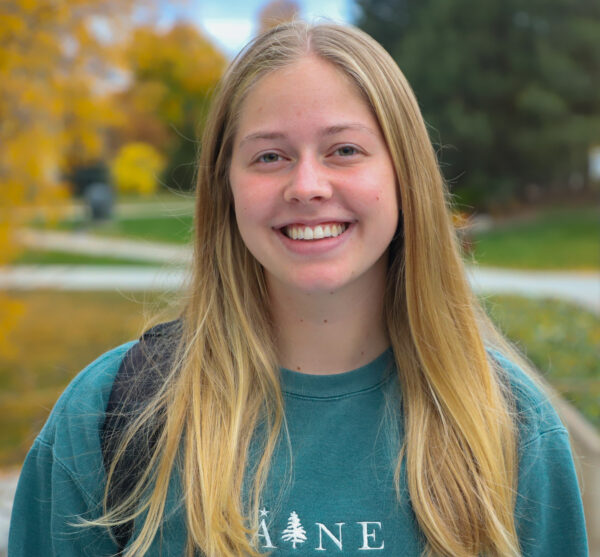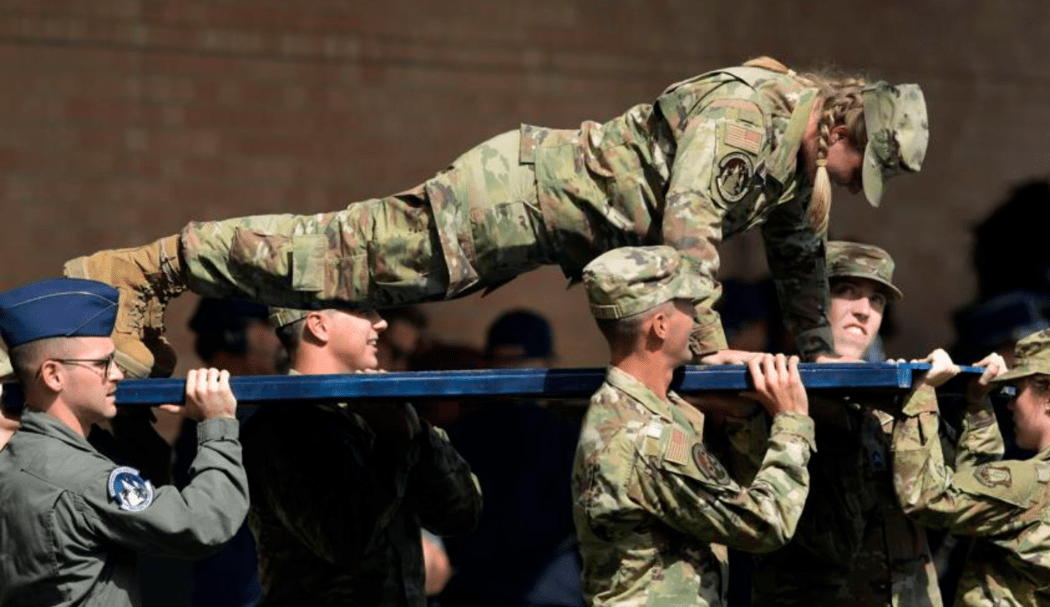Cadet Grace Lowry and her journey in the Air Force ROTC
Nov. 11 is a day when Americans celebrate the heroes of the military, specifically veterans. However, on Utah State University’s campus, new heroes are being trained every day, like Cadet Grace Lowry.
According to the USU AFROTC website, the program “allows you to dive head first into the theory of leadership, allowing you to test and systematically develop your skills.”
Lowry has been part of the Air Force ROTC program on campus since the fall 2021, starting as an aerospace studies 100 cadet.
Lowry said this time is mostly about learning the possible roles in the Air Force, along with building strength and leadership skills.
“Your first year is mainly learning about the program and figuring out where you fit in,” Lowry said. “You’re required to take a physical training credit, you go to an academic class, and then on Thursdays, we have our leadership laboratory.”
Lowry said finding her spot in the program was not too difficult, as she knew what she wanted to do going into it. It helped that her recruiting officer had the same major of education, so she got to see firsthand what could be done in the force with that degree and correlating passions.

Capt. Lowery as of October 25 just outside the TSC. // Photo Zachary Guercio
“She was in force support,” Lowry said. “That kind of aligned with my values, so I knew what I wanted to do going into it.”
According to Lowry, the automatic connection with a career path doesn’t happen for every cadet, but she assures that every cadet eventually finds their path.
“I’ve heard from many officers that sometimes the Air Force knows you better than you know yourself, and they’ll put you in the place that works best for you,” Lowry said.
Lowry said the second year continues earlier training, but it really hones leadership styles.
“Second year, you’ve kind of decided what you’re doing,” Lowry said. “You’re still taking those classes, but it’s preparing you more to be a leader. You’re also preparing for field training, which happens the next summer.”
Field training itself is a lot of work, and preparation ramped up for Lowry in the spring of her second year. She completed her field training this summer in Alabama and is now a distinguished graduate.
These first two years are known as general military courses. This allows people to “try out Air Force ROTC 100% commitment free for the first two years … before signing any contract or service commitment,” according to the USU AFROTC website.
The next two to three years are called professional officer courses; Lowry is in this stage, and she enjoys it.
“It’s where you are leading leaders,” Lowry said. “ROTC is a cadet-run program. Those cadets that were just training are now the instructors. You’re in more of a teacher role, which is what I really like about it.”
This program can be intense, but Lowry loves it. She discussed how ROTC fits into her everyday life. There’s physical training in the mornings, classes in the afternoons, and homework and meetings at night. On top of this, her role as a flight commander requires her to help out the cadets in her flight to prepare for the subsequent phases of their training.
“I’m preparing all the time, getting my flight and myself ready so that we’re all prepared to execute when we need to,” Lowry said.
Once field training is finished, cadets become contracted. Lowry said she isn’t sure how long she will serve in the Air Force, but she is excited for when the time comes.
“Right now, I’m planning on doing four years,” Lowry said. “I’ve considered doing more because I think it would be really cool to be an ROTC instructor.”
Lowry didn’t always plan on being in ROTC. She said she initially heard about the program from her mom, who suggested it to her older brother when he graduated from high school.
The biggest draw at first was ROTC’s scholarship program, but Lowry has stayed because of the leadership lessons, community and sense of purpose she found.
“It’s taken me way out of my comfort zone and made me into a better person and helped me fulfill my potential,” Lowry said. “I’ve had a lot of great mentors throughout the program that push me and have given me so many opportunities.”
One of those mentors is Maj. Andrew Spratt, the operations officer for Detachment 860, which Lowry is a part of. He came into Utah State’s program at the same time as Lowry, so she was one of the first cadets he interacted with at USU. He spoke highly of Lowry’s work ethic and goal of bettering herself and her fellow cadets.
“I could tell from the beginning she was a sharp student,” Spratt said. “She kind of came in and found her own. She’s embraced the fact that this is the place to grow and develop her leadership.”
Spratt said Lowry is a natural at what she does.
“She has a natural leadership talent. Lots of other cadets see and gravitate to her,” Spratt said. “I couldn’t think of anybody better for the force support officer role.”
Lowry said she loves being a supportive officer and compared being in ROTC to competing in an individual style sport, like cross-country, tennis or swimming.
“You’re working to improve the unit as a whole while working to improve yourself along the way, and you’re making everything better,” Lowry said.
Spratt has noticed that Lowry truly does make things better. He said she is an excellent example of the Air Force’s values.
“Integrity first, service before self and excellence in all we do; she really lives that,” Spratt said.
Lowry has loved her experience in ROTC and urges any who want to try it out to go for it.
“It never hurts to try,” Lowry said.
If interested, students can find out more about USU’s AFROTC program at usu.edu/aerospace/index.

